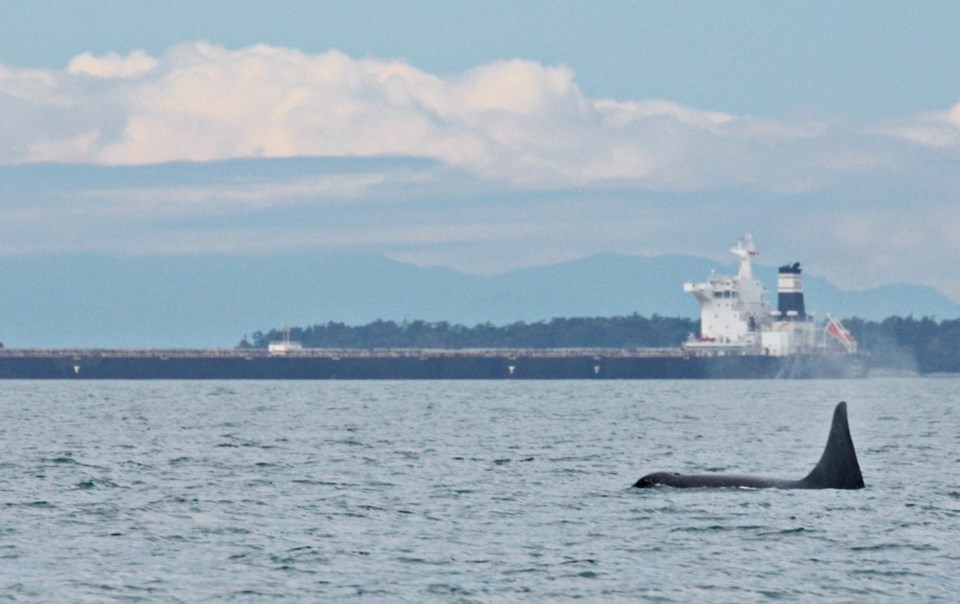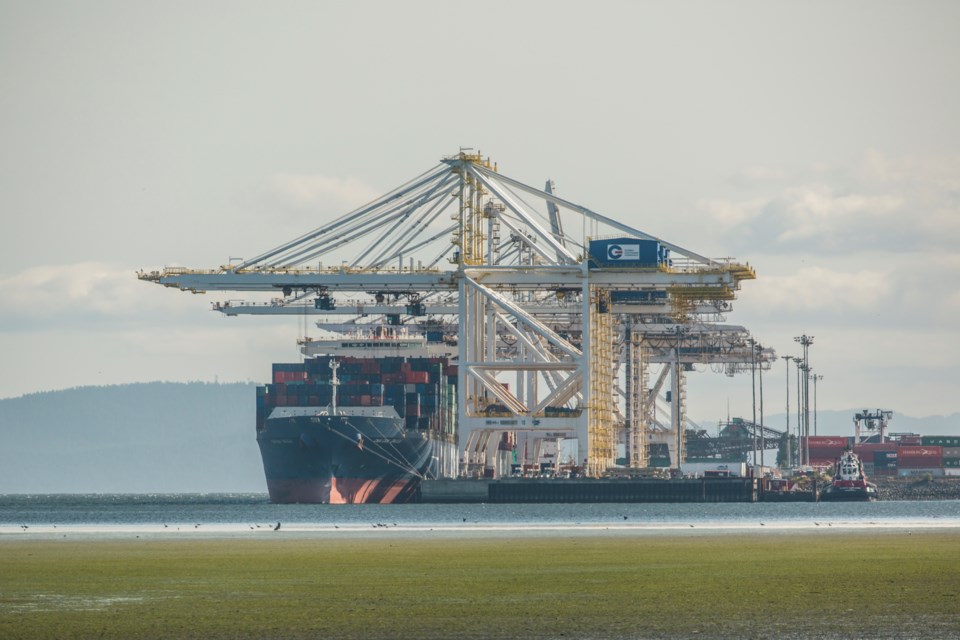The Canadian government’s approval to expand the country’s largest port failed to properly justify how it would reduce or eliminate threats to endangered southern resident killer whales and their critical habitat — an “unreasonable” decision that breached the federal Species at Risk Act, a Vancouver Federal Court heard Monday.
Those claims, made by lawyers for four environmental groups before Justice Christine Pallotta, came 14 months after the federal government approved the Roberts Bank Terminal 2 expansion project in Delta, B.C.
Built on a new man-made island adjacent to the current Deltaport container facility, the Vancouver Fraser Port Authority project seeks to add a three-berth marine container terminal, a widened causeway that would expand road and rail lines, and an extended basin for tugboats.
The expansion is forecast to grow container capacity on Canada’s West Coast by a third. Without it, the federal government says $3 billion in added GDP would be put at risk by capacity shortages.
Despite its economic impact, detractors of the port expansion say building the facility will destroy 177 hectares of vital habitat for juvenile chinook salmon, the southern residents’ preferred prey. Noise from construction of the port’s expansion, as well as a subsequent increase in shipping, could also throw off the whales’ ability to forage.
Those consequences to the endangered whales were outlined in a May 2023 request for a judicial review of the port expansion decision, filed in Canada's federal court by Georgia Strait Alliance, David Suzuki Foundation, Raincoast Conservation Foundation, and Western Canada Wilderness Committee.
Lucero González, a conservation and policy campaigner for the Wilderness Committee, said outside the court Monday her organization joined the request for a judicial review because the port expansion project could push the southern resident killer whales to extinction. More than that, she said the project’s approval threatens the very foundation of endangered species law in Canada.
“There really doesn't seem to be a limit on how damaging a project can be for the federal government and provincial government to be like, ‘Let's not approve this,’” said González.
“Why do we have laws protecting them if they're not going to do anything?”
24% chance of functional extinction
Ranging from California to B.C., the southern residents' numbers have stagnated at around 75 individuals for decades. The genetically distinct population was listed as endangered under the Species at Risk Act in 2003.
In the two decades since, scientists say the whale is threatened by a combination of climate change, toxic chemicals, vessel strikes and underwater acoustic disturbances.
One of the biggest threats to the animals is a lack of food. Roughly 80 to 90 per cent of the southern resident killer whales' diet comes from chinook salmon. But the salmon species is already dwindling in the face of habitat destruction, overfishing, disease and the impacts of global warming on the ocean. A suffering prey population means fewer fish for whales to hunt.
Add noise from shipping traffic, which can effectively blind killer whales by interfering with their ability to echolocate prey, and a whale’s prospect of getting enough fish to survive sinks.
The most recent analysis from Fisheries and Oceans Canada shows they face a 24 per cent chance of functional extinction as early as 75 years from now.
‘Justified in the circumstances’
In its April 2023 decision, cabinet acknowledged that the expansion project would have “significant adverse effects” on the whales but that they were “justified in the circumstances.”
Approval for the project came with 370 legally binding conditions to protect the environment and prevent harm to local species.
But the federal decision failed to clearly list any new measures that would directly avoid, lessen or minimize effects on the whales, measures that are required by law under the Species at Risk Act, argued Ecojustice staff lawyer Dyna Tuytel.
Tuytelsaid some of those measures listed by the federal government in its approval seek to minimize shipping noise. But ships around the world are getting bigger, and while overall traffic might not increase, more ships could be diverted to the Roberts Bank expansion, according to court documents.
The applicants' lawyer told the court that many measures to protect the whales only dealt with existing noise and not future increases. She pointed to seasonal closures under the Whales Initiative — closures that are “not required to continue” and do not apply to shipping lanes that go to and from the port expansion.

The port’s voluntary speed reduction ECHO Program, meanwhile, is “not enforceable” and not guaranteed to continue, Tuytel said.
Some programs could help produce measures in the future through research studies, policy development and data gathering. Tuytel told the court those are “all important things, but not measures that are capable of avoiding or lessening a project's effects.”
In its first round of arguments, the environmental groups ultimately argued that cabinet's decision to approve the project lacks “justification, transparency, and intelligibility” and fails to make it clear how it and the environment minister fell into line with the Species at Risk Act.
“We’re not looking at the scientific merits of the measures but whether they adhere to the law,” Tuytel said.
Is there a 'floor' for protecting endangered species?
Ecojustice lawyer Kegan Pepper-Smith argued before the court that the federal government’s move to approve the port expansion has set up a novel legal collision between two laws. He said it has raised questions over whether the Species at Risk Act can restrict the decisions made under the Canadian Environmental Assessment Act.
“This question of whether a major project such as the terminal theory will jeopardize a species’ existence goes to the core of the purposes of SARA. It is untenable and unreasonable to claim that the governor-in-council had no obligation to grapple with that question…” Pepper-Smith said.
The port expansion represents the first time a major industrial project is coming into direct conflict with a species protected as endangered under Canada’s Species at Risk law, said Margot Venton, a staff lawyer and head of the nature program at Ecojustice, the firm representing the applicants.
Multiple scientific and government panels have found that, unmitigated, the expansion project will accelerate the extinction trajectory of southern resident killer whales.
“We've never gotten to the end of an environmental assessment where the cabinet has justified significant adverse impacts that will accelerate extinction trajectory. Factually, that hasn't happened,” said Venton.
“It's a pretty profound question in a lot of ways. Is there a floor of protection for endangered species in Canada, or is there not?”
Arguments continue Tuesday
On Tuesday, lawyers for the attorney general of Canada are expected to argue that the environment minister and cabinet’s order-in-council decision are both reasonable.
They are expected to further submit that the environmental groups' arguments are “misplaced” and misinterpret the Species at Risk Act. As court wrapped up Monday, federal lawyer Jon Khan said the Roberts Bank Terminal 2 expansion underwent “the longest environmental assessments in Canadian history.” He called on Justice Pallotta to throw out the case.
The two-day judicial review will later include submissions from lawyers for the Vancouver Fraser Port Authority.
Judges in similar cases often take around six months to render a decision.




